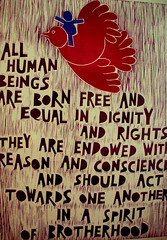Human rights report critiques blog censorship
 There has been much said this week about the recent American report on human rights in Fiji. From the perspective of a Fiji blogger, it is interesting to see that blogs are explicitly mentioned several times in the report. Here are the relevant sections:
There has been much said this week about the recent American report on human rights in Fiji. From the perspective of a Fiji blogger, it is interesting to see that blogs are explicitly mentioned several times in the report. Here are the relevant sections:
Internet Freedom
There were no government restrictions on general public access to the Internet. However, the military attempted to censor or shut down a number of antigovernment blogs that appeared after the coup, and the Public Service Commission warned civil servants against accessing or taking part in antigovernment Web sites. The military extensively monitored Internet chat rooms on these Web sites. In May the RFMF announced that it was following three individuals alleged to be involved with antigovernment blogs. Also in May, a businessman accused by the military of involvement with such a blog was detained by RFMF personnel at an army camp, where he was verbally and physically abused. Several other individuals suspected of maintaining blogs or posting on blogs were threatened or intimidated. Two senior civil servants accused of contributing to a blog were suspended from duty and subjected to disciplinary action. At least two persons were arrested for allegedly authoring or forwarding e-mail messages critical of the interim government.The Internet was widely available and used in and around urban centers, and the majority of the population lived in areas with
Internet coverage. However, low-income persons generally could not afford individual service, and other public access was very limited. Access outside urban areas was minimal or nonexistent.
Academic Freedom and Cultural Events
Academic freedom was generally respected; however, government work‑permit stipulations prohibit foreigners from participating in domestic politics. University of the South Pacific contract regulations effectively restrict most university employees from running for or holding public office or holding an official position with any political party. RFMF agents reportedly infiltrated the university campus to monitor any political activity. The RFMF also threatened to terminate scholarships from the Fijian Affairs Board, a government-funded statutory body, for university students who contributed to antigovernment blogs.
[Fiji. Country reports on human rights practices. US Department of State. March 11, 2007]
Most of this seems to refer to well known events from the first half of 2007. Readers, what do you think?
- Is this report acurate?
- Is it still unsafe to blog in Fiji?
- Does the US really have the right to criticize the human rights practices of other countries?
- Would anyone from the interim government like to comment on this section of the report?
Photo by: riacale
Blogged with Flock

2 comments:
"...Public Service Commission warned civil servants against accessing or taking part in antigovernment Web sites. The military extensively monitored Internet chat rooms on these Web sites..."
One has to remember that as a civil servant, the issue of choosing whether or not to support the government of the day is simply not an option. Whoever is in power at that point in time - be it military or elected, must be supported by the civil servants. Perhaps the PSC has simply done its job by reminding all members that opposing their employer is not a good thing. This is normal even in normal organizations - if you plan to oppose your EMG's and CEO, then you're likely to lose your job soon. Thats what happened to the two senior civil servants: "Two senior civil servants accused of contributing to a blog were suspended from duty and subjected to disciplinary action."
Is this report acurate? Not fully
Is it still unsafe to blog in Fiji? It is safe to blog in Fiji or about Fiji as long as you're not writing some seditious or threatening civil unrest.
Does the US really have the right to criticize the human rights practices of other countries? The US needs to clean up it's own backyard first - their abuse against Iraqi's and the Afghan people are quite famous. It's refusal to stop torture as a means of obtaining information are horrifying. It's refusal to reduce CFC emissions is sad and its racist policies towards Mexicans and other races is simply pathetic.
Would anyone from the interim government like to comment on this section of the report? Probably not since the report is not worth so much attention as it's slanted and did not consult all key stakeholders - as usual, the US had produced another slanted report about what it thinks is the truth rather than what really is the truth.
No the report is not accurate.
It is safe to blog?
Yes, but blogging should be accurate and fair, absent of posts that incite violence or use racial overtones.
US Human Rights reports.
Has the US State Department done a report on itself. No.
Sadly, the US State Department is filled with career diplomats who do not ever challenge the status quo.
As Malcom X said, the US is the biggest exporters of terror.
Although, the US Ambassador says the US is not infalliable; he avoids the issue of hypocrisy.
How can the US downplay, extraordinary rendition, which is a grave breach of international law and then turn around and measure the human rights violations in other countries.
As stated in the bible, why worry about the speck in your brothers eye, when you have log protruding from your own eye.
Post a Comment